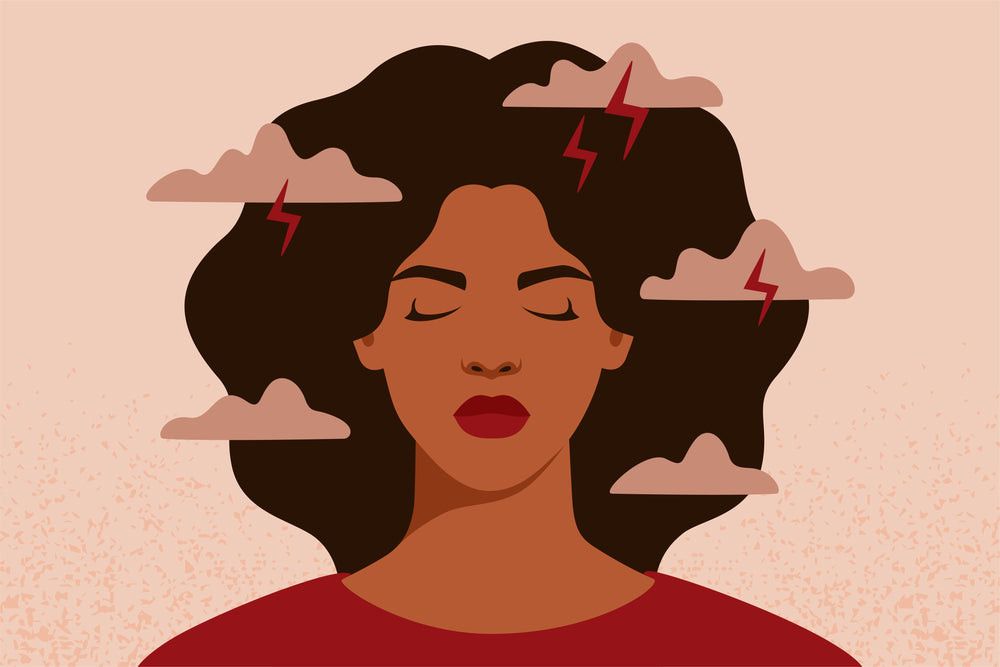Popular diets or even health professionals may tell you to “eat this” and “not that” as broad-stroke guidelines to reduce stress and anxiety. The gut and brain communicate with each other via the gut-brain axis. Certain types of gut bacteria create neurotransmitters that influence mood (like GABA, serotonin, dopamine, and other substances). Half of your dopamine (a pleasure messenger) and almost all (90%) of your serotonin are produced in the gut.
Practices like reducing coffee intake, mindful meditation, or getting enough sleep are often touted as techniques to deal with anxiety. These may work to an extent, but what if we tell you, good mental health is made in the kitchen? You read that right, to fully take control of your mental health, you need to ensure you’re consuming foods that nourish you, and exclude foods that are the root-cause of unwanted mental conditions like anxiety and stress.
Following are 5 fundamental ways to reduce anxiety through better eating habits!
#1 Avoid Processed Foods (they are not your friends!)
Unfortunately, processed foods are a staple of the Western diet and contribute to “leaky gut.” This happens when the intestinal barrier wall becomes permeable and bacteria can leach into the bloodstream. Inflammation ensues and brings with it a host of other health issues.
What to Do About Processed Food?
With busy lifestyles, processed food can be hard to avoid. Especially if you’re travelling most of the time, managing multiple tasks or even jobs - add to that - different schedules of everyone in the house! A health guide comes in very handy in such times - no matter if you’re eating at McDonalds or KFC, a food guide like the one from a Digbi program will outline processed foods to avoid. This way you can at least take care to not eat the harmful stuff (processed carbohydrates) like bread (I know, ugh!), cookies, chips, and crackers. The other half of your health journey is including nutrient-dense meal options - ones that are easy to obtain at restaurants, popular food chains, and meal delivery companies. Yep, these are all part of the Digbi Food Guide.
Your Results
Processed foods contribute to anxiety and also other inflammatory and metabolic disorder comorbidities. From those who had the most severe anxiety, almost all Digbi members reduced their symptoms.
#2 Increase Fiber Intake
A major tenet for healthy eating is: Improving Fiber Diversity. It isn’t just about getting those salads in, it is also about getting a variety of it to give your gut microbiome the diversity it needs. If you’re eating the same vegetable types every week, you’re not giving your gut biome enough variety for optimal fitness. Also, the quantity of fiber matters - getting the right amount is crucial.
What Can You Do?
Studies show that a nutrient-rich diet with ample fiber is connected with less risk for inflammatory diseases and anxiety. You can find fiber in plant-based foods like fruits, veggies, and whole grains.
Conveniently, select types of gut bacteria digest fiber for us and turn it into short-chain fatty acids (SCFA). Only certain microbes are qualified for this job. SFCAs in turn help with a host of functions that help reduce inflammation. That’s why it’s important to foster these specific bacteria.
#3 Enjoy Anti-Inflammatory Meals
The third, and perhaps the most important tenet to manage anxiety is: Managing Inflammation.
Research shows that a flourishing microbiome is essential for optimal health, especially for people suffering from anxiety. Mental illness is correlated with inflammation (your body’s response to infection and illness) in the central nervous system.
Short-chain fatty acids are integral to reducing inflammation, and researchers have observed increased butyrate in those with higher gut bacteria diversity. Butyrate reduces inflammation and may also protect against colon cancer. At Digbi, your levels of microbial genes responsible for short-chain fatty acids production (like butyrate) are analyzed. Your levels of microbial genes that are involved in production of other helpful substances like polyamines are also evaluated, because they are essential for your cells’ proliferation, existence, and regeneration.
Guided meal recommendations from a certified nutritionist can help you identify foods that are causing inflammation in your body, and help develop a sustainable meal plan designed for your unique biology!
#4 Increase Prebiotic & Probiotic Levels
Probiotics are valuable bacteria (live microorganisms) that our gut biome craves. They help our bodies soak in nutrients. Probiotics alleviate anxiety because they can restore a thriving microbial balance. There is a link to dysbiosis (a lack of beneficial gut bacteria) and anxiety. Probiotics have the ability to lessen symptoms. New research shows that probiotics had a similar positive effect on anxiety as prescription medications.
You Eat Probiotics,
But What Do Probiotics Eat?
Prebiotics play a role in feeding probiotics and therefore are essential to good mental health as well. Studies show that prebiotics stabilize the level of positive gut bacteria and reduce anxiety.
Examples of Probiotics
- Fermented dairy: like kefir and cottage cheese
- Other fermented foods: like sauerkraut and miso
- Special Tip: Even broth is probiotic!
Examples of Prebiotics
- Dark chocolate (yes!)
- Jicama, onions, & garlic
#5 Fix those nagging GI Disorders
Anxiety and gut issues are intrinsically linked, and the biggest catch-22 is - one triggers the other. So if you’re stressed or have anxiety, you may end up with an imbalanced gut. Conversely, if you have dysbiosis of the gut, it may aggravate your anxiety levels.
This is why it is important to feed the body with the right kind of foods. You could also be feeding your body the wrong foods and therefore promoting pro-inflammatory bacteria that are causing anxiety.
The bottomline? - Approach health holistically and personalized - by decoding your genetics and looking at your unique gut biome. Start building a stress free version, serotonin rich version of YOU, with Digbi Health.
If you want to find out more, schedule a 30 minute call with Scott Levy, Chief Business Officer.





